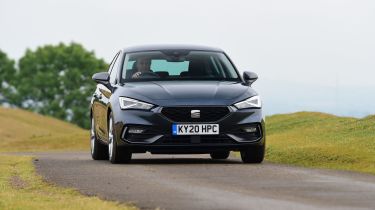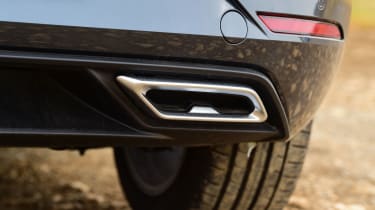SEAT Leon review - Engines, drive & performance
Keen drivers should enjoy the SEAT Leon's connected feel
While it's closely based on the Volkswagen Golf, the SEAT Leon is the model intentionally injected with a little more flair and usually a sportier driving experience. So, is that still the case this time? We certainly found there's something about the Leon that encourages you to grip the steering wheel that little bit more tightly and select its more engaging driving modes.
There's a slightly more direct connection between the car and the road on tight twisty roads than in most family hatchbacks, the steering is fast to react to inputs and the brakes react progressively but strongly to your right foot. This feel is enhanced in the FR model, which also looks the most like a hot hatchback from outside, thanks to its bodykit, bigger wheels and slightly lower suspension. It corners the flattest but the ride is firmer too.
SEAT Leon petrol engines
The petrol range originally started with a 1.0-litre, three-cylinder engine with 108bhp, but as of May 2024 this has been replaced with a 1.5-litre TSI petrol four-cylinder with 113bhp and a six-speed manual gearbox. Above this is a 1.5-litre eTSI mild-hybrid version with a seven-speed automatic transmission. Above this are 148bhp TSI and eTSI versions with a manual and automatic, respectively. The 2.0-litre TSI that sat at the top of the petrol range with 187bhp and a standard seven-speed DSG automatic was discontinued a few years ago.
More reviews
The 148bhp model certainly felt punchy enough for a family hatchback when we drove it. That's backed up by its 0-62mph-time of 8.7 seconds, while its top speed is 135mph. The mid-level version takes 9.4 seconds to cover the same benchmark. We noticed that the engine seems to drone more on the move, but it's otherwise smooth and refined.
Diesel engines
Like the Golf and Skoda Octavia, the Leon is also available with a 2.0-litre TDI diesel offering 113bhp or 148bhp. This replaces the 1.6-litre diesel engine in the previous model and is aimed primarily at delivering big fuel economy on a long run.
Plug-in hybrid engines
The Leon was previously available with Volkswagen Group's plug-in hybrid powertrain, based around a 1.4-litre petrol engine, electric motor and 13kWh lithium-ion battery pack. In May 2024 this was updated to use the same 1.5-litre engine in the mild-hybrid and petrol versions, and the battery pack was made bigger at 19.7kWh. Official power and performance figures are yet to be confirmed for the updated setup.
Based on our experience of the old 1.4-litre hybrid, the Mercedes A 250 e was slightly better at switching between petrol and electric in its hybrid mode but even when its battery is depleted, the Leon e-Hybrid is still economical. Over 120 miles of driving we saw 48mpg, which would be a far higher figure if we'd been able to stop and charge the battery.










